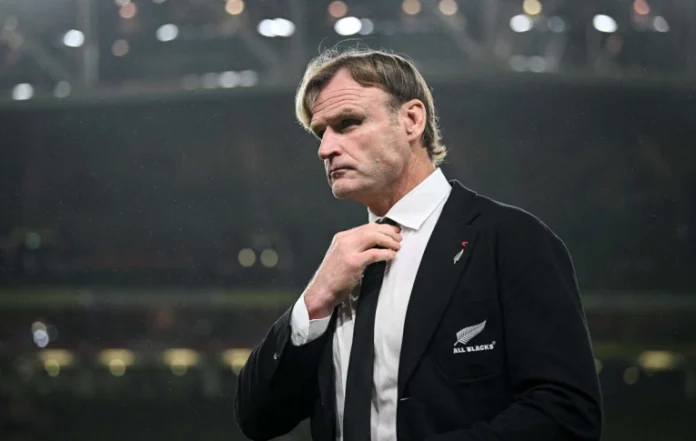
[ad_1]
A year that began with All Blacks coach Scott Robertson wondering out loud whether the time had come for New Zealand rugby’s self-imposed eligibility rules to be changed, ended with Robertson upping the ante and making a more direct plea to his employer to take his suggestion seriously.
That Robertson, at the end of his first year in charge, hardened on his belief that the All Blacks should have access to some players currently offshore, has become a subject of fierce domestic debate.
The conservatives and traditionalists are unmoved and unimpressed by his political campaigning. No previous All Blacks coach has ever openly pressed for the policy to be changed.
Scott Robertson has openly advocated for New Zealand to change its stance on not picking overseas stars (Photo Seb Daly/Sportsfile via Getty Images)
There have been cases where exemptions were made – Steve Hansen was able to pick Matt Todd in 2018 when the flanker was contracted to Panasonic – but for the last 30 years, every All Blacks coach has publicly supported the union’s policy.
Robertson’s decision to advocate for change has, therefore, been interpreted as PR spin designed to create a narrative that deflects and contextualises what was a relatively underwhelming year, in which the All Blacks finished with 10 wins and four losses.
The conservatives don’t believe the system failed, they say Robertson failed, and they question whether he would be so determined to see the rules change if the All Blacks had won, say, 12 from 14?
Robertson, in what he has said publicly, is building his argument for change as a means to close the gap that is increasing between the All Blacks and South Africa
Those who are opposed to letting players contracted to offshore clubs represent the All Blacks believe that Robertson’s motivation for wanting to do so is driven almost exclusively by his desire to gain access to his former Crusaders No.10, Richie Mo’unga.
Robertson and Mo’unga have a long history together. They are close, trust one another and Robertson has barely hidden his desire to get the 50-cap fly-half out of his three-year contract with Toshiba Brave Lupus, or failing that, change the rules to enable the All Blacks to pick him even if he’s playing his club rugby in Japan.
But as Hansen said on the DSPN podcast: “It’s obvious they want Richie Mo’unga back. Are we doing it because they want Richie back or are we doing it because we think it’s right? That’s the question you have to answer.”
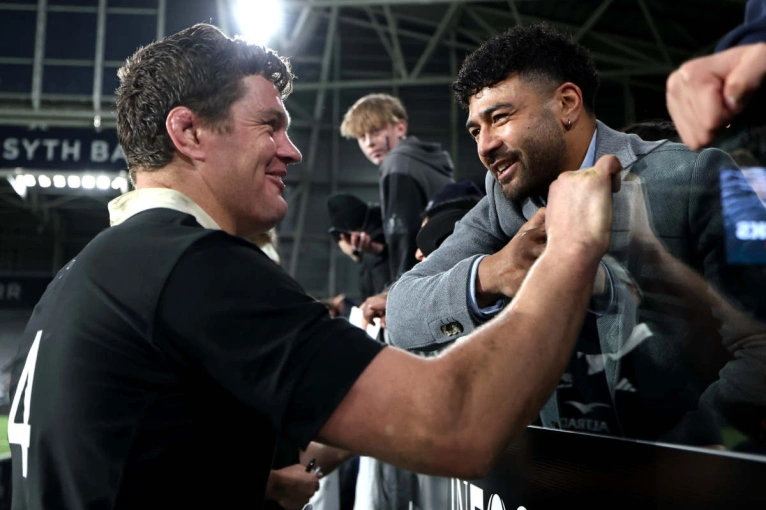 Richie Mo’unga was among the crowd to see New Zealand’s home series win over England in July (Photo Hannah Peters/Getty Images)
Richie Mo’unga was among the crowd to see New Zealand’s home series win over England in July (Photo Hannah Peters/Getty Images)
Robertson, in what he has said publicly, is building his argument for change as a means to close the gap that is increasing between the All Blacks and South Africa.
The Boks have not only won back-to-back World Cups, but they have also beaten the All Blacks on the last four occasions they have met.
The two defeats that Robertson suffered in 2024 in South Africa, he says, best illustrated the key difference between the two countries.
Both games saw the All Blacks lead coming into the last 30 minutes, only for the momentum to shift dramatically once the two sides emptied their respective benches.
How do we get the balance right to ensure that players who have given loyalty, longevity and who are still playing well, can be available?
Robertson’s view is that because the Boks don’t lose access to their experienced players when they head offshore, it gives them an advantage that is not only about having older, wiser heads on the field in those critical closing minutes, it also gives them ready-made mentors to guide the next generation.
“Rassie’s [Springboks coach Rassie Erasmus] got a great example,” says Robertson. “He can take his young players to Europe to learn and grow and other ones in Japan and pick a whole group of what is required. A beautiful cohesion of youth and experience.
“Sam Cane and Ardie Savea with Wallace Siti, what a balance that is. [Scrum-half] Cortez [Ratima] inside Beauden or DMac [Damian McKenzie] who he plays a lot of rugby with. Those combinations, how do you set them up because it is really valuable off field and on.
“How do you, over this next four-year period, get enough cohesion, enough experience and enough matches, how do you get enough calluses on the hands of those younger guys to be able to be at their best when it matters?
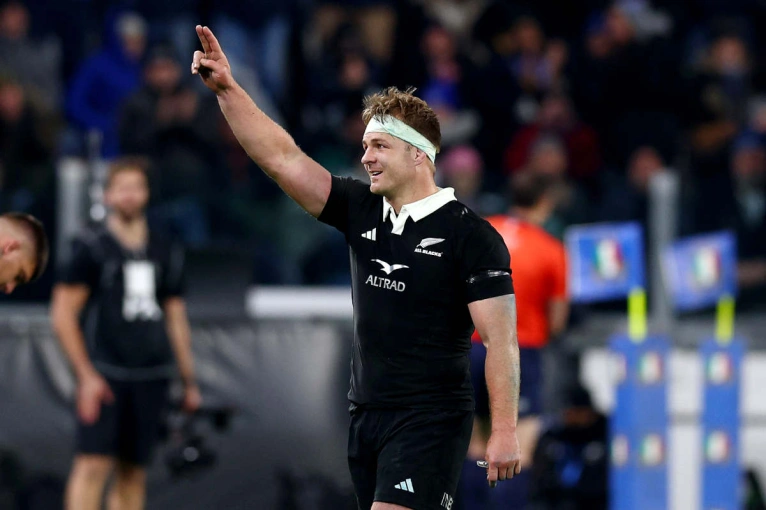 Sam Cane played his last Test for New Zealand against Italy, pending a return to Japanese rugby (Photo Francesco Scaccianoce/Getty Images)
Sam Cane played his last Test for New Zealand against Italy, pending a return to Japanese rugby (Photo Francesco Scaccianoce/Getty Images)
“It is a bit of a repeat for me, but I want people to keep an open mind of what New Zealand rugby needs right now for the good of the game from grassroots right through to All Blacks.
“What was four years ago, three years ago, two years ago is different. It has changed. Not many go north, more go to Japan, so how do we get the balance right to ensure that players who have given loyalty, longevity and who are still playing well, can be available? They are going, and they are going to go anyway.”
It’s no surprise that those opposed to making any change say this is again an issue for Robertson to solve by developing New Zealand’s homegrown talent and it has always been the challenge for an All Blacks coach to stay ahead of the opposition.
The money is good, the coaching is first-class and the standard of rugby in the Top League, where 30 per cent of the Springboks’ World Cup squad play, is rising all the time
But there is an equally compelling counter argument that says Robertson is not deflecting from any coaching deficiencies in the All Blacks, but making irrefutable points which reflect the way global rugby has changed in the last four years.
And maybe he’s not trying to save his reputation but save New Zealand rugby from continuing to persevere with a policy that may no longer be fit for purpose given the way the labour markets have changed.
His point about Japan being the preferred destination for New Zealand’s top players is irrefutable. The money is good, the coaching is first-class and the standard of rugby in the Top League, where 30 per cent of the Springboks’ World Cup squad play, is rising all the time.
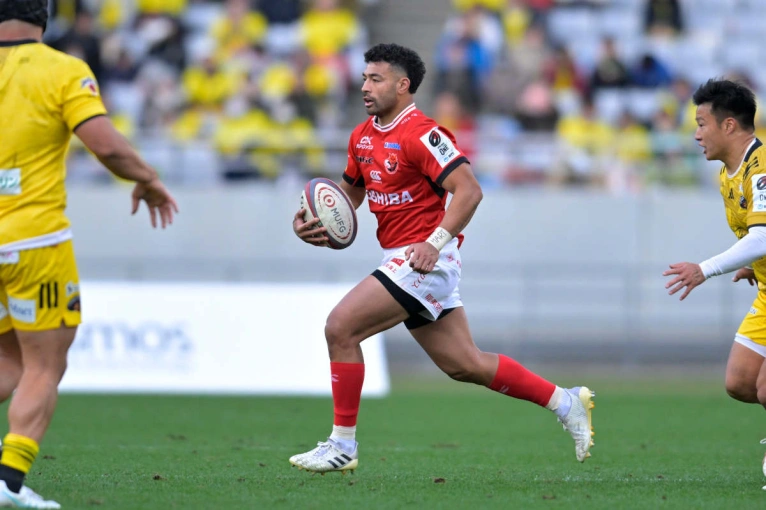 Richie Mo’unga guided Toshiba Brave Lupus to the Japan Rugby League One title in his first season (Photo Koki Nagahama/Getty Images)
Richie Mo’unga guided Toshiba Brave Lupus to the Japan Rugby League One title in his first season (Photo Koki Nagahama/Getty Images)
For the last five years, NZR has been relying on its policy of allowing long-serving players the right to take a ‘sabbatical’ as a perk contained within a four-year contract.
Beauden Barrett and Ardie Savea played in Japan this year on sabbaticals – as both have committed to staying in New Zealand until the 2027 World Cup.
These deals have enabled the big names to enjoy bumper pay days in Japan, skip Super Rugby and yet still be eligible for the All Blacks immediately after they come home.
But Japanese clubs are not keen on these short-term deals. “The Japanese clubs are more interested in two or three years, not one-year sabbatical deals,” says Cane, the former All Blacks captain who this year signed with Suntory on a three-year contract.
“They will do it for the absolute superstars, but they would much rather have that longer contract so they can make a longer-term impact.”
Robertson has also been trying to impress upon the decision-makers at NZR that it seems mad to him that he now has to lose a player such as Cane
Robertson can see that the sabbatical may be blunted as a retention tool and has been trying to persuade NZR to allow players to sign two-year deals in Japan and allow them to be eligible for the All Blacks through the duration of the contract.
It makes sense as it would create a win-win-win – the players would get two years offshore and the money that comes with it, the All Blacks wouldn’t be impacted and the Japanese clubs would be able to build more of a marketing story around the superstar talent.
It could, arguably, even be a win for Super Rugby clubs as it would at least give them greater certainty about when they would have access to players, as currently with the sabbatical clause, no-one is ever sure when they will be invoked.
But Robertson has also been trying to impress upon the decision-makers at NZR that it seems mad to him that he now has to lose a player such as Cane, who he believes brings inordinate value as both a player and a leader, simply because he’s no longer playing club rugby in New Zealand.
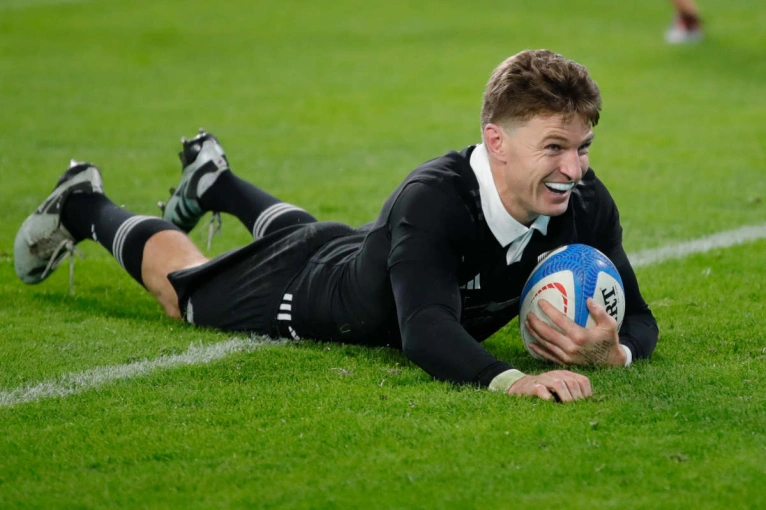 Beauden Barrett underlined his value to New Zealand this year but he could yet take another sabbatical (Photo Timothy Rogers/Getty Images)
Beauden Barrett underlined his value to New Zealand this year but he could yet take another sabbatical (Photo Timothy Rogers/Getty Images)
He may also lose Barrett at the end of next year as the veteran playmaker, despite being contracted through to 2027, has dispensation to leave whenever he likes. And again, why not have a system that allows a player of Barrett’s experience to remain available to the All Blacks should he decide to play in Japan?
Experience is a priceless commodity in international rugby and New Zealand has a system where it throws away players precisely when they are at their most valuable.
A gap has opened up between the All Blacks and Springboks, and Robertson’s constant references to the South Africa model giving them an advantage shouldn’t be read as either self-protectionism on his part or a plea for New Zealand to emulate their selection policy of being able to pick players from anywhere in the world.
It should be read for what it is – an undeniable observation that it doesn’t make sense for New Zealand to deny itself access to world-class experienced players when it has the ability to change its own policies.
[ad_2]
Copyright for syndicated content belongs to the linked Source link

